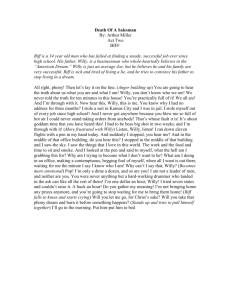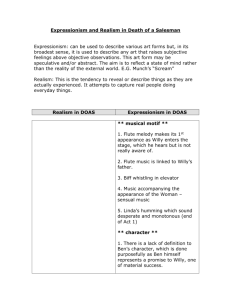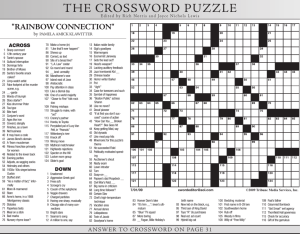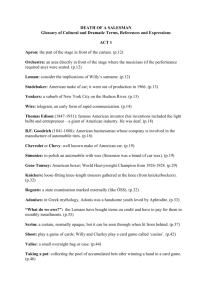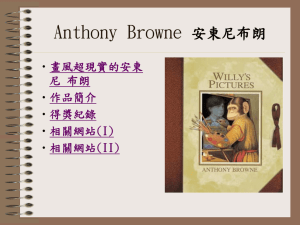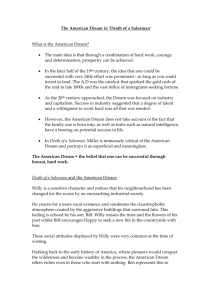Who's Afraid of Virginia Woolf?
advertisement
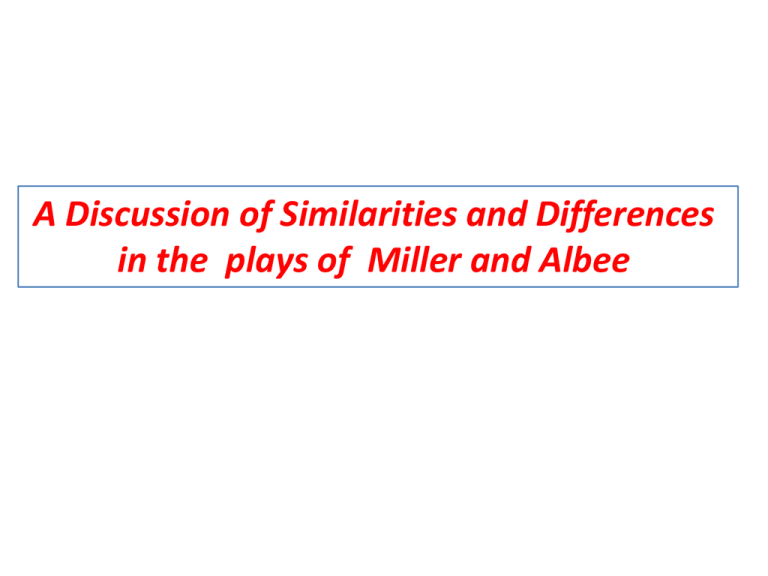
A Discussion of Similarities and Differences in the plays of Miller and Albee – the beginning of the plays -the ending of the plays –plot -Themes -structure -characters Death of a Salesman The main character’s work as car salesman is very important to him and his family for it is their major of income. His family depends on him for everything and the family man in him made him stick to his pride 'til the very end even when he lost his job. Not one member of his family knew that he had been fired from his work, his only source of living to his family. He went on with this day in and day out until there came a time when it was obvious to everyone that there wasn't any money coming in to put food on the table.It was this extreme feelings of desperation and uselessness that drove the salesman into depression and anxiety which ultimately brought him to his untimely death. Who's Afraid of Virginia Woolf? The play is set on the campus of a small, New England university. Nick, actually works in the biology department. He and his wife, Honey, walk into a brutal social situation. Martha and George try to fight and humiliate each other in new, inventive ways. George and Martha use Honey and Nick as pawns, transforming their guests into an audience to witness humiliation, into levers for creating jealousy, and into a means for expressing their own sides of their mutual story. These games get even nastier. The evening turns into a nightmare. George and Martha even attack Honey and Nick, attempting to force them to reveal their dirty secrets and true selves. Finally, in the last act, "The Exorcism," everyone's secrets have been revealed and purged. Honey and Nick go home, leaving Martha and George to try to rebuild their shattered marriage. Death of a Salesman Who's Afraid of Virginia Woolf? The Salesman image was from the beginning absorbed with the concept that nothing in life comes next, but that everything exists together and at the same time within us; that there is no past to be ‘brought forward’ in a human being but that he is his past at every moment and that the present is merely that which his past is capable of noticing and smelling and reacting to. The imaginary child reveals a deep intimacy between these now bitterly disappointed characters. They must have spent years together, whispering various fantasies of parenthood, dreams that would never come true for either of them. Then, in later years of their marriage, they turned their illusionary son against one another. They each pretended that the child would have loved the one and despised the other. Death of a Salesman Who's Afraid of Virginia Woolf? The exhausted, idealistic man who has visions of a great future for his sons does not in the end come to terms with reality, but retains his hopes. To Willy, death is the only answer. . In the final line, George actually becomes affectionate. He softly sings, “Who’s afraid of Virginia Woolf,” while she leans against him. She confesses her fear of Virginia Woolf, her fear of living a life facing reality. It is perhaps the first time she reveals her weakness, and perhaps George is finally unveiling his strength with his willingness to dismantle their illusions. themes The play is mostly told from Willy's point of view, and it shows previous parts of Willy's life in his time shifts, sometimes during a present day scene. It does this by having a scene begin in the present time and adding characters onto the stage that only Willy can see and hear, representing characters and conversations from other times and places. Many dramatic techniques are also used to represent these time shifts. The play's structure: resembles a stream of consciousness account: Willy drifts between his living room, downstage, to the apron and flashbacks of an idyllic past, and also to fantasized conversations with Ben. Themes Themes are the fundamental and often universal ideas explored in a literary work. 1- The American Dream: Willy believes wholeheartedly in what he considers the promise of the American Dream—that a “well liked” and “personally attractive” man in business will indubitably and deservedly acquire the material comforts offered by modern American life. Oddly, his fixation with the superficial qualities of attractiveness and likeability is at odds with a more gritty, more rewarding understanding of the American Dream that identifies hard work without complaint as the key to success Abandonment Willy’s life charts a course from one abandonment to the next, leaving him in greater despair each time. Willy’s father leaves him and Ben when Willy is very young, leaving Willy neither a tangible (money) nor an intangible (history) legacy. Ben eventually departs for Alaska, leaving Willy to lose himself in a warped vision of the American Dream. Likely a result of these early experiences, Willy develops a fear of abandonment, which makes him want his family to conform to the American Dream. His efforts to raise perfect sons, however, reflect his inability to understand reality. Betrayal: Willy’s primary obsession throughout the play is what he considers to be Biff’s betrayal of his ambitions for him. Willy believes that he has every right to expect Biff to fulfill the promise inherent in him. When Biff walks out on Willy’s ambitions for him, Willy takes this rejection as a personal affront (he associates it with “insult” and “spite”). Willy, after all, is a salesman, and Biff’s ego-crushing rebuff ultimately reflects Willy’s inability to sell him on the American Dream—the product in which Willy himself believes most faithfully Who's afraid of Virginia woolf? ( Themes) Reality vs. Illusion: Edward Albee has said that the song, "Who's Afraid of Virginia Woolf?" means "Who is afraid to live without illusion?" At the end of the play, Martha says that she is. Indeed, the illusion of their son sustains George and Martha's tempestuous marriage. Ultimately, George takes it upon himself to "kill" that illusion when Martha brings it too far into reality. Throughout the play, illusion seems indistinguishable from reality. It is difficult to tell which of George and Martha's stories about their son, about George's past are true or fictional. Similarly, Nick and Honey's lives are based on illusion. Nick married for money, not love. Games and War The title of the first act is "Fun and Games." That in itself is deceptive, for the games that George and Martha play with their guests are not the expected party games. Rather, their games of Humiliate the Host, Get the Guests, and Hump the Hostess which involves the characters' deepest emotions. George's characterization of these emotionally destructive activities as games and assumption of the role of ring master reveals that all the events of the evening are part of a power struggle between him and Martha, in which one of them intends to emerge as victorugh he looks strong and forceful, he is impotent. History vs. Biology George and Nick's academic departments at New Carthage College set up a dialectic in which Albee presents a warning about the future of life. George is an associate professor in the History Department, while Nick is a new member of the Biology Department. Old, tired, and ineffectual, George exemplifies the subject that he teaches. What's more, he notes that no one pays attention to the lessons of history just as Nick ignores George's sincere advice, responding contemptuously, "Up your!" Nick, as a representative of science, is young and vital. In the words of George, he is the "wave of the future." Through Nick and George's argument about Biology and History, Albee demonstrates two clashing worldviews. George's lack of success in the History Department and inability to rise to power as successor to the president of the college contrasts with Nick's plans and The American Dream The title of one of his earlier plays, the American Dream was a significant concern of Albee's. In Who's Afraid of Virginia Woolf?, he explores the illusion of an American dream that masks a core of destruction and failure. Writing during the Cold War, Albee was responding to a public that was just beginning to question the patriotic assumptions of the 1950's. His George and Martha reference patriotic namesakes George and Martha Washington. Albee uses this symbolic first couple's unhappy marriage as a microcosm for the imperfect state of America Style: A good part of the reason Who’s Afraid of Virginia Woolf? appeared so vibrantly new, so challenging, to theatergoers in 1962 is the novel and often surprising manner in which its author combined different theatrical styles and techniques. In particular, Albee straddled a divide between a predominantly naturalistic American playwriting tradition of social criticism, and what was beginning to be called the “Theater of the Absurd” (Martin Esslin published a landmark study with that same title in 1961). Philosophically almost all of Albee’s dramatic writing is aligned with the absurdist idea that human existence is essentially pointless Characters: Who's afraid of Virginia woolf? Albee uses George and Martha to show the effects when a society crams definitive, non-pliable gender roles down the throats of women and men. Nick and Honey’s presence shows that even those that strive to be the ideal cannot sustain the image without serious consequences. All four characters are damaged irrevocably and act out via violence, alcoholism and infidelity as substitutes for happiness and ways to forge identity. Engaging in this behaviors makes them feel something, anything when their gender identity feels nonexistent. Being seductive makes Martha feel like a woman and being violent lets George play out his macho fantasies. Who's afraid of Virginia woolf? In this play, Edward Albee presents a set of characters who are supposed to have received the best that modern education can offer. However, this very civilized and cultured lot behaves in an extremely uncivilized manner. This is an important irony in the play. George like Martha, has had a traumatized past. His story about a school acquaintance killing his mother and Death of Salesman Through the main character in this play, Willy Loman, Miller examines the myth of the American Dream and the shallow promise of happiness through material wealth. The family, couldn’t distinguish between reality and illusion, particularly Willy. Willy He cannot see who he and his sons are. He believes that they are great men who have what it takes to father in an accident can be seen as possibly autobiographical. At one point Martha claims that it was George who killed his parents exactly the same way as the boy in the story did. Her caustic remarks about the book he wrote and her accusation that he is a "murderer" provide more evidence that George's story is indeed his own. If so, his actions and behaviors, as well as his fear of life would all make sense. George is in retreat from the world. be successful and beat the business world. Unfortunately, he is mistaken. In reality, Willy and sons are not, and cannot, be successful. Willy vey often falls into a flashback and appears to be reliving conversations and situations that occurred years ago. This shows his inability to conversations and situations that occurred years ago. The meaning of the title, Who's Afraid of Virginia Woolf?, becomes clearer as the play progresses, but so far we know that it comes from a joke at a cocktail party. The song usually goes, "Who's afraid of the big bad wolf?" Virginia Woolf was an English writer during the first half of the twentieth century. She wrote in the style of stream-ofconsciousness, which tried to mimic the thought patterns of her characters. One might be afraid of Virginia Woolf because she tries to understand the intricacies of the human mind and heart. She is so honest that she might frighten characters like George and Martha, who hide behind their insults. At the same time, her writing is also very complex and intellectual. Therefore, one might be afraid of not understanding her. In the competitive world of a University, no one would want to admit to being afraid to read something by her. The title, then, could also refer to the competition that George feels at his job, and the need that all people within that academic environment have to puff up their own intelligence. -The Cold War: Albee wrote Who's Afraid of Virginia Woolf? while America was in the midst of the Cold War with the U.S.S.R. The two nations had teamed up against the Nazis in WWII, but it didn't take long for them to turn against each other after they no longer had a common enemy -The American Dream: In 1962, when Who's Afraid of Virginia Woolf? premiered on Broadway, America was still in a the mindset of the 1950s. People -Seeds: Seeds represent for Willy the opportunity to prove the worth of his labor, both as a salesman and a father. His desperate, nocturnal attempt to grow vegetables signifies his shame about barely being able to put food on the table and having nothing to leave his children when he passes. Willy feels that he has worked hard but fears that he will not be able to help his offspring any more than his own abandoning father helped him. worked, built, and multiplied all in the name of the American Dream. For many Americans this meant acquiring a happy stable family, a happy stable house, and (if you were a man) a happy stable job. Christian Rituals Throughout the play there are several Christian symbols as well. The chiming of doorbell is much like the chiming of bells at a Catholic mass. Also, the entire play takes place on The seeds also symbolize Willy’s sense of failure with Biff. Despite the American Dream’s. formula for success, which Willy considers infallible, Willy’s efforts to cultivate and nurture Biff went awry. Realizing that his all-American football star has turned into a lazy bum, Willy takes Biff’s failure and lack of ambition as a reflection of his abilities as a father. -Diamonds: To Willy, diamonds represent tangible wealth and, hence, both validation of one’s labor (and life) and the ability to pass material goods on to one’s offspring, two things that Willy desperately craves. A Sunday. George also shows off his Catholic chanting skills when he intones Kyrie Eleison and the Dies Irae, both part of the Requiem. Act 3 is called "The Exorcism," which is the Catholic practice that supposedly evicts demons or evil spirits from a person or home. The spirit in question in Act 3 is George and Martha's "son. Correlatively, diamonds, the discovery of which made Ben a fortune, symbolize Willy’s failure as a salesman. Despite Willy’s belief in the American Dream, a belief unwavering to the extent that he passed up the opportunity to go with Ben to Alaska, the Dream’s promise of financial security has eluded Willy. At the end of the play, Ben encourages Willy to enter the “jungle” finally and retrieve this elusive diamond— that is, to kill himself for insurance money in order to make his life meaningful. -Religious Ritual Pagan Rituals Act 2 of the play is called "Walpurgisnacht." That's a big word and refers to a festival that occurs on April 30th in many European countries. Though the holiday is now named after the Catholic St. Walpurga, its rituals and meanings are of pagan origin and it is more closely associated with pagan ritual than Catholicism. Walpurgisnacht is a lot like Halloween, as it's an evening for witches, spirits, and ghosts. Kids even go out and play pranks. It's kind of a tease though, because there's "tricks" but apparently no "treats" in particular. Tsk, tsk, Europe Linda’s and The Woman’s Stockings Willy’s strange obsession with the condition of Linda’s stockings foreshadows his later flashback to Biff’s discovery of him and The Woman in their Boston hotel room. The teenage Biff accuses Willy of giving away Linda’s stockings to The Woman. Stockings assume a metaphorical weight as the symbol of betrayal and sexual infidelity. -Babies: This play is chock full of baby images. It seems like Albee slips one in at least every other page. First of all, George and Martha call each other "baby" all throughout the play. Martha also calls Nick that a few times too. One of those occasions is the first time they kiss. Nick touches her breast and she pushes him away saying, "Take it easy, boy. Down, baby." New stockings are important for both Willy’s pride in being financially successful and thus able to provide for his family and for Willy’s ability to ease his guilt about, and suppress the memory of, his betrayal of Linda and Biff. -The Rubber Hose: The rubber hose is a stage prop that reminds the audience of Willy’s desperate attempts at suicide. He has apparently attempted to kill himself by inhaling gas, which is, ironically, the very substance essential to one of the most basic elements with which he must equip his home for his family’s health and comfort—heat. Literal death by inhaling gas parallels the metaphorical death that Willy feels in his struggle to afford such a basic necessity.

